News / Middle East
Iraq's Violence Spirals Out of Control
September 19, 2013
Iraq is grappling with its worst violence in years with almost daily bombings and attacks undermining the country's fragile framework and rivaling the dark days of civil unrest in 2007 and 2008.
Just this week, car bombs rippled through Baghdad, part of a series of explosions across Iraq that left at least 31 dead.
The violence has escalated steadily after U.S. troops largely pulled out of the country at the end of 2011.
Civilian deaths in Iraq have more than doubled in the last year, according to a United Nations casualty count.
According to statistics from the United Nations Assistance Mission, August to August one year tallies show deaths up from 2,000 in 2012 to 4,800 in 2013.
Appeal for help
Iraqi Prime Minister Nouri al-Maliki appealed for help this week. In a televised speech on Wednesday, he urged "citizens, politicians and journalists" to support security forces as they try to chase down what he called "the terrorists."
But analysts say much more than terrorism is at play. The violence is largely sectarian, they say, and fueled by many complicating factors including a political deadlock in Baghdad and a spillover of al-Qaida activity from the conflict in Syria.
The Iraqi government has been stalled for months amid a Sunni-Shi'ite political and social divide.
Washington-based analyst Anthony Cordesman said Maliki may have contributed to the unrest when he moved broadly to consolidate power in his Shi'ite-dominated government, leaving Sunnis feeling disenfranchised.
"On the Sunni side, support for violence has broadened significantly," said Cordesman, who works at the Center for Strategic and International Studies. "The government is resisting, largely as a Shi'ite entity."
Cordesman, who co-authored a September report on Iraq's violence, said the unrest is also fueled by social discontent brought on by high unemployment, little industry growth, and a poor distribution of oil revenue amid a dispute between Baghdad and the Kurdish minority in the oil-rich north.
"These forces are forces that make it very hard to govern Iraq and very hard to stop the violence," he said.
Iraq's government this week released a five-year economic plan to try to diversify beyond oil production and develop the industrial sector. But the plan faces major obstacles and, if recent history is any indication, will be difficult to implement, analysts say.
The political and economic situation is complicated too by the fate of the Kurds. Kurdish voters go to the polls Saturday in elections for seats in the self-rule region’s local parliament. Increasingly, Kurds are insisting on more separation from the government in Baghdad,
Syria fallout
Besides internal strife, Iraq is facing a fallout from Syria's civil war.
Carnegie Middle East Center analyst Paul Salem said Iraq's Sunnis may feel emboldened by the Sunni opposition in Syria.
"If the Sunnis in Syria make more headway there, the Sunnis in Iraq feel that that might empower them to push back against Maliki and a sort of Shi'ite - dominated government," he said.
Salem said al-Qaida militants fuel unrest in both countries.
"Al-Qaida takes advantage of discontent among the Sunni community [in Iraq] and it can express the more radical discontent, the more militant discontent as in Syria," he said. "The protests began as unarmed and rather civil. As the protests turned into an armed conflict, al-Qaida certainly found a foothold."
Government blames 'terrorists'
Speaking in Washington on Wednesday, Iraq's ambassador to the United States, Lukman Faily, said Iraq's security apparatus has not been a match for al-Qaida, especially after U.S. troops largely pulled out after a near-decade long presence.
"We lost focus and al-Qaida took advantage of that," he said. "Now we are talking back with your partners to provide the right tools, the capabilities and, more importantly for us, to understand the lessons learned."
Faily said the Iraqi government was determined to provide a safe environment and protect citizens.
But the escalating violence shows there is little evidence to support that and Iraqis in general say they fear a descent into chaos, something analysts would lead to further destabilization in an already volatile Middle East.
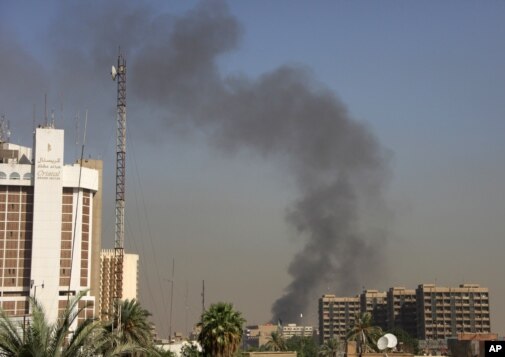
Just this week, car bombs rippled through Baghdad, part of a series of explosions across Iraq that left at least 31 dead.
The violence has escalated steadily after U.S. troops largely pulled out of the country at the end of 2011.
Civilian deaths in Iraq have more than doubled in the last year, according to a United Nations casualty count.
According to statistics from the United Nations Assistance Mission, August to August one year tallies show deaths up from 2,000 in 2012 to 4,800 in 2013.
Appeal for help
Iraqi Prime Minister Nouri al-Maliki appealed for help this week. In a televised speech on Wednesday, he urged "citizens, politicians and journalists" to support security forces as they try to chase down what he called "the terrorists."
But analysts say much more than terrorism is at play. The violence is largely sectarian, they say, and fueled by many complicating factors including a political deadlock in Baghdad and a spillover of al-Qaida activity from the conflict in Syria.
The Iraqi government has been stalled for months amid a Sunni-Shi'ite political and social divide.
Washington-based analyst Anthony Cordesman said Maliki may have contributed to the unrest when he moved broadly to consolidate power in his Shi'ite-dominated government, leaving Sunnis feeling disenfranchised.
"On the Sunni side, support for violence has broadened significantly," said Cordesman, who works at the Center for Strategic and International Studies. "The government is resisting, largely as a Shi'ite entity."
Cordesman, who co-authored a September report on Iraq's violence, said the unrest is also fueled by social discontent brought on by high unemployment, little industry growth, and a poor distribution of oil revenue amid a dispute between Baghdad and the Kurdish minority in the oil-rich north.
"These forces are forces that make it very hard to govern Iraq and very hard to stop the violence," he said.
Iraq's government this week released a five-year economic plan to try to diversify beyond oil production and develop the industrial sector. But the plan faces major obstacles and, if recent history is any indication, will be difficult to implement, analysts say.
The political and economic situation is complicated too by the fate of the Kurds. Kurdish voters go to the polls Saturday in elections for seats in the self-rule region’s local parliament. Increasingly, Kurds are insisting on more separation from the government in Baghdad,
Syria fallout
Besides internal strife, Iraq is facing a fallout from Syria's civil war.
Carnegie Middle East Center analyst Paul Salem said Iraq's Sunnis may feel emboldened by the Sunni opposition in Syria.
"If the Sunnis in Syria make more headway there, the Sunnis in Iraq feel that that might empower them to push back against Maliki and a sort of Shi'ite - dominated government," he said.
Salem said al-Qaida militants fuel unrest in both countries.
"Al-Qaida takes advantage of discontent among the Sunni community [in Iraq] and it can express the more radical discontent, the more militant discontent as in Syria," he said. "The protests began as unarmed and rather civil. As the protests turned into an armed conflict, al-Qaida certainly found a foothold."
Government blames 'terrorists'
Speaking in Washington on Wednesday, Iraq's ambassador to the United States, Lukman Faily, said Iraq's security apparatus has not been a match for al-Qaida, especially after U.S. troops largely pulled out after a near-decade long presence.
"We lost focus and al-Qaida took advantage of that," he said. "Now we are talking back with your partners to provide the right tools, the capabilities and, more importantly for us, to understand the lessons learned."
Faily said the Iraqi government was determined to provide a safe environment and protect citizens.
But the escalating violence shows there is little evidence to support that and Iraqis in general say they fear a descent into chaos, something analysts would lead to further destabilization in an already volatile Middle East.
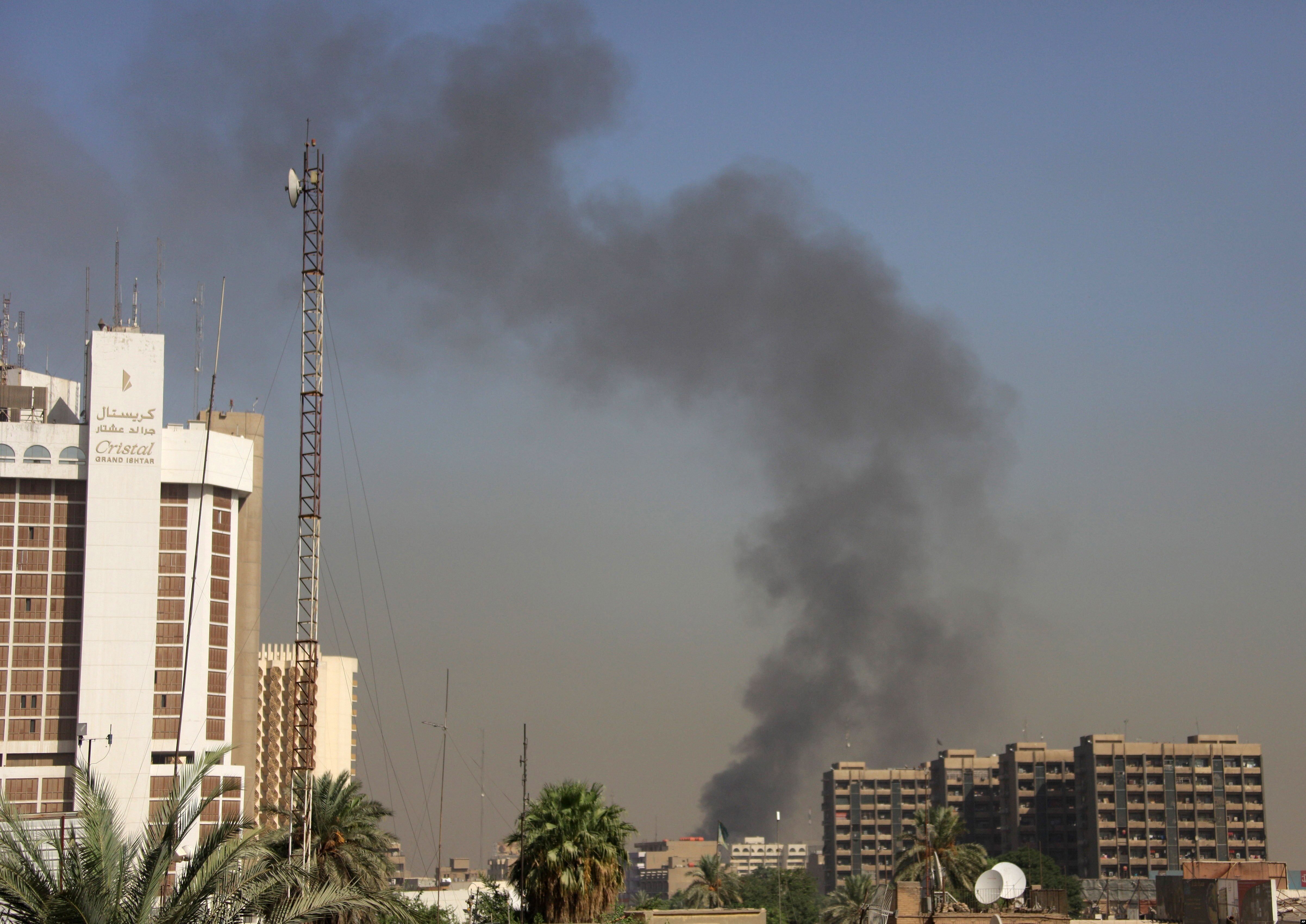
Smoke rises after a car bomb attack in front of the Ministry of Higher Education and Scientific Research in central Baghdad, Sept. 18, 2013.
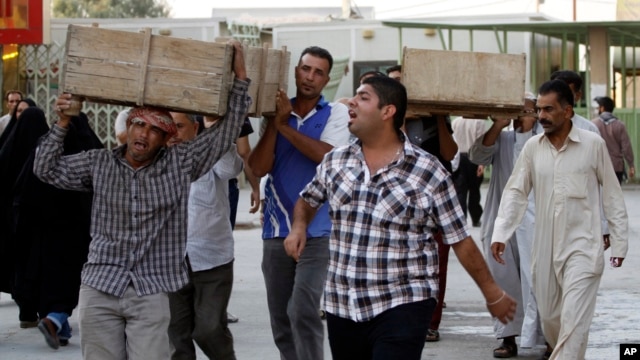
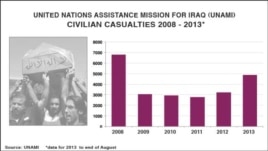
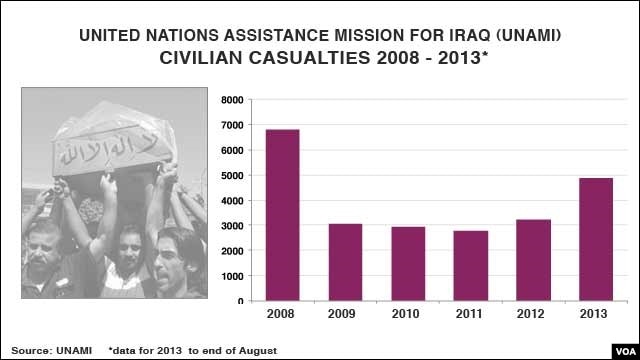
No comments:
Post a Comment